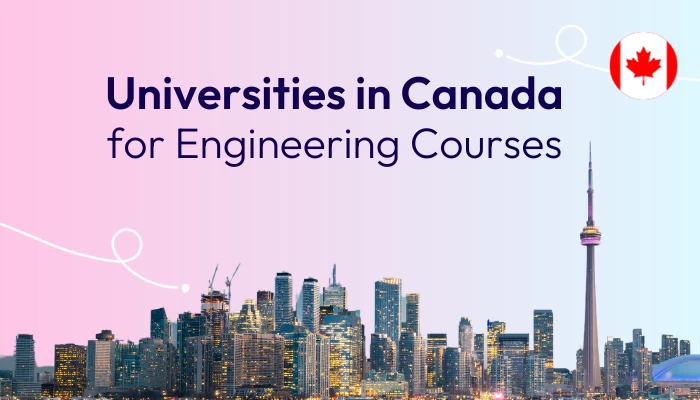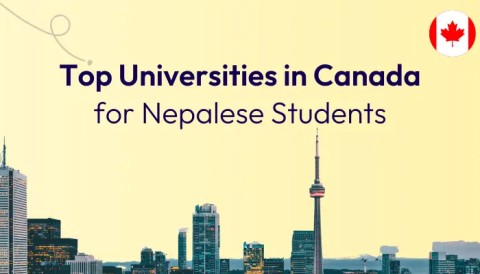Top universities in Canada offering engineering and technology courses.

Top universities in Canada offering engineering and technology courses.
Obtaining a Canadian engineering or technology degree as an overseas student can help you access career and research opportunities. Canada is home to some of the top engineering and technology programs in the world because of its renowned universities’ emphasis on research and academic quality.
International students can enrol in undergraduate or graduate engineering and technology programs at many Canadian universities. If you’re looking for a university to attend, this resource highlights some of the top engineering and technology universities in Canada, gives you a rundown of their programs, their tuition costs for international students, and their general admission requirements.

Requirements for admission to programs in engineering and technology.
engineering and technology undergraduate programs.
Undergraduate engineering programs in Canada usually last four years. In certain instances, the curriculum could last an additional year if it includes co-op terms. A Bachelor of Applied Science (BASc) or Bachelor of Engineering (BEng) degree is normally awarded upon successful program completion, while some universities provide alternative degrees for specialised programs like software engineering.
After graduating from high school, you might be able to enrol for an undergraduate engineering degree in Canada as an international student. Transcripts and your high school diploma (or its Canadian equivalent) must be included with your admissions application.
Engineering programs in Canadian universities are usually competitive, and to be eligible, you must have good high school scores. A minimum average score of 75 to 85 percent is required by several of the best universities. Universities may also demand that you have taken high school courses in English, physics, chemistry, and mathematics, including calculus. Additionally, certain colleges might request your SAT results.
Admission to undergraduate engineering programs typically requires English language skills as well. If English is not your first language, you will need to take an English language test like the TOEFL or IELTS.
Numerous Canadian institutions will evaluate your accomplishments outside of the classroom, such as involvement in extracurricular activities or exhibiting leadership traits.
Graduate courses in technology and engineering.
A relevant undergraduate degree that is equal to a four-year Canadian bachelor’s degree with at least a mid-B average grade, or a score of 75 to 80 percent, is required in order to apply for a master’s degree in engineering or technology. As an alternative, you may be eligible to apply if you have finished both a three-year bachelor’s and a master’s degree in your original country.
You must have a master’s degree in science (physical, chemical, or biological sciences), technology, or engineering with at least a B+ equivalent grade in order to be admitted to doctoral programs.
Along with academic or professional references, the majority of colleges also demand a statement of intent that includes a description of your research and academic interests. To create a selection of potential students, universities may also interview candidates.
You must verify your English proficiency by receiving a high score on the IELTS, TOEFL, Canadian Academic English Language Assessment (CAEL), or another recognised language benchmark test if English is not your first language or if your undergraduate degree was taught in a different language.
Top engineering and technology universities in Canada.
Many of the top colleges in the world for engineering and technology degrees are located in Canada. The following Canadian universities are among the top 150 in engineering and technology according to the QS World Rankings 2024:

Toronto University in Ontario
Programs for undergraduates:
Engineering Science (EngSci), Chemical Engineering, Civil Engineering, Electrical and Computer Engineering, Industrial Engineering, Material Engineering, Mechanical Engineering, and Mineral Engineering are the eight main tracks for Bachelor of Applied Science (BASc) programs. For students who wish to experiment with many engineering specialities before deciding on one at the conclusion of their first year, the institution also provides a TrackOne, Undeclared program.
Postgraduate courses:
There are two kinds of engineering graduate programs offered by the University of Toronto:
1. Research degrees: A four-year Doctor of Philosophy (Ph.D.) in Engineering can be attained by completing a two-year Master of Applied Science (MASc).
2. Professional degrees: Master of Engineering (MEng) programs in one of the following fields of study, lasting two years:
1. Aerospace Studies Institute at the University of T (UTIAS)
2. Department of Chemical Engineering & Applied Chemistry 3. Department of Civil & Mineral Engineering 4. Institute of Biomaterials & Biomedical Engineering (BME)
5. The Department of Electrical and Computer Engineering, Edward S. Rogers Sr.
6. Materials Science & Engineering Department
7. Mechanical and Industrial Engineering Department.
International students’ tuition costs:
1. The first-year tuition cost for overseas students enrolled in undergraduate engineering programs is $65,410 CAD. The cost
2. The annual tuition for the MEng program is $66,670 CAD.
3. The annual tuition fees for the Ph.D. and MASc programs are $6,210 CAD and $28,900 CAD, respectively, which is relatively lower. Funding is also provided to registered students in these programs to pay for their tuition and other related costs.
Vancouver, British Columbia University.
Programs for undergraduates:
A foundation year is required for all UBC Engineering Bachelor of Applied Science (BASc) programs. Following that, students have the option to specialise in any of the 14 areas listed below: Integrated engineering, manufacturing engineering, materials engineering, mechanical engineering, mining engineering, biomedical engineering, chemical and biological engineering, civil engineering, computer engineering, electrical engineering, engineering physics, environmental engineering, and geological engineering.

Postgraduate courses:
1. Thesis-based research programs: eight core areas—biomedical, chemical and biological, civil, electrical and computer, mechanical, materials, and mining engineering—are covered by one-year Master of Engineering (MEng), two-year Master of Applied Science (MASc), and four-year Doctor of Philosophy (Ph.D.) programs.
2. Professional degrees include a 12-month Master of Engineering Leadership (MEL) with eight specialisation options (Advanced Materials Manufacturing, Dependable Software Systems, Clean Energy Engineering, High Performance Buildings, Integrated Water Management, Naval Architecture and Marine Engineering, Sustainable Process Engineering, and Urban Systems) and a 12- to 16-month Master of Engineering (MEng) in one of eleven subject areas (Mechatronics Design, Mining Engineering, Biomedical Engineering, Chemical and Biological Engineering, Civil Engineering, Electrical and Computer Engineering, Electrical Engineering, Mechanical Engineering, Mechatronics Design, Mining Engineering, and Naval Architecture and Marine Engineering).
International students’ tuition costs:
1. International students enrolling in BASc programs in 2022 will pay $54,986.81 CAD per year in tuition.
2. The MEng program costs 22,774.89 CAD in total tuition. The total cost of tuition for the MEL program is $58,803.42 CAD. The annual tuition for other graduate programs is around $9,313.92 CAD.








